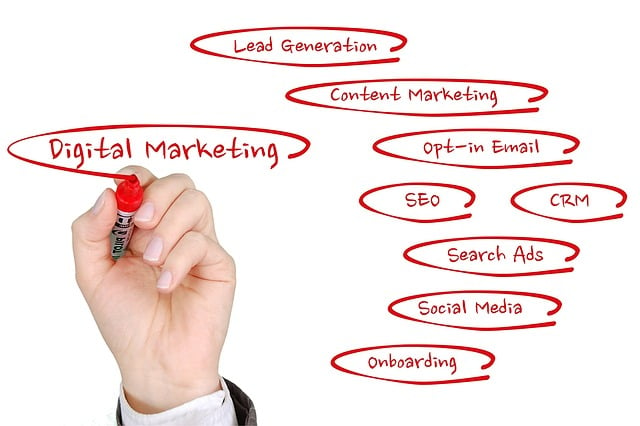An effective MSP marketing strategy is one that not only aligns sales and marketing initiatives for cohesive client engagement but also leverages advanced technology to streamline operations and enhance service delivery. By utilizing CRM systems, RMM tools, predictive analytics, and AI integration, MSPs can personalize support, anticipate future market trends, and stay ahead of the curve. Continuous improvement and adaptability in partnership agreements are crucial for maintaining relevance and ensuring that terms and conditions evolve with changing demands. This proactive approach to contract management, combined with staying informed on industry trends, allows MSPs to offer top-notch services and maintain high customer satisfaction, which is key for sustained growth and successful client relationships. By focusing on customized solutions that address the unique needs of shared clients, MSPs can solidify their reputation as essential partners in their clients' success and set themselves apart in a competitive market.
Navigating the competitive landscape of managed IT services requires strategic partnerships that are both productive and mutually beneficial. This article delves into top strategies for forging successful Managed Service Provider (MSP) alliances, emphasizing how an effective MSP marketing strategy can synergize with partner goals to expand market reach and enhance service offerings. We’ll explore methods for identifying the right partners, establishing robust communication channels, co-branding for joint marketing initiatives, and aligning sales efforts for maximized client acquisition and retention. Additionally, we’ll address leveraging technology to streamline operations, managing shared clients effectively, and continuously refining partnership agreements for optimal performance. These strategies are designed to empower MSPs to form robust alliances that drive growth and success in today’s digital marketplace.
- Leveraging Synergies: Aligning MSP Marketing Strategy with Partner Goals
- Identifying Ideal Partners for Complementary Expertise and Market Reach
- Establishing Clear Communication Channels for Efficient Collaboration
- Co-Branding and Joint Marketing Initiatives: Enhancing Mutual Visibility
- Customizing Service Offerings to Meet the Needs of Shared Clients
- Strategic Sales Alignment: Unifying Approaches for Maximized Conversion Rates
- Utilizing Technology for Streamlined Operations and Client Management
- Regularly Reviewing and Adapting MSP Partnership Agreements for Continuous Improvement
Leveraging Synergies: Aligning MSP Marketing Strategy with Partner Goals

In the realm of Managed Service Providers (MSPs), forging successful partnerships hinges on the ability to leverage synergies between organizations. A pivotal aspect of this is aligning MSP marketing strategies with those of their partners. By understanding and integrating partner goals within their marketing efforts, MSPs can create a cohesive approach that maximizes mutual benefits. This alignment ensures that both parties are working towards the same objectives, thereby enhancing the value proposition to clients and increasing market share. MSPs should conduct thorough research to grasp the unique strengths of their partners, enabling them to tailor their marketing campaigns in a way that complements their partner’s capabilities and target audience. This synergy not only amplifies brand visibility but also fosters trust and credibility within the market, ultimately leading to stronger customer relationships and more robust business growth. By continuously engaging with partners to refine and adjust these strategies, MSPs can ensure that their marketing efforts are not only effective but also resonate with the shared vision of success.
Effective partnerships in the MSP space require a commitment to ongoing collaboration and communication. Regular strategy sessions between MSPs and their partners provide an opportunity to evaluate the effectiveness of joint marketing initiatives and make necessary adjustments. These discussions should focus on measurable outcomes, feedback from clients, and market trends that can inform future strategies. By staying attuned to these dynamics, MSPs can maintain a dynamic and responsive marketing strategy that not only supports their partners but also adapts to the ever-evolving IT landscape. This proactive approach to partnership ensures that both entities are positioned to capitalize on new opportunities, drive innovation, and deliver exceptional value to customers.
Identifying Ideal Partners for Complementary Expertise and Market Reach

In the realm of Managed Service Providers (MSPs), forging successful partnerships is a cornerstone of growth and innovation. A pivotal aspect of this is identifying partners that complement your expertise and expand your market reach. An effective MSP marketing strategy should prioritize seeking out entities with non-overlapping skill sets, enabling you to offer comprehensive solutions to clients. This synergy not only enhances the value proposition but also opens doors to new customer segments that might have been inaccessible otherwise. By partnering with companies that excel where you are less experienced, or that serve different market niches, MSPs can create a competitive advantage. For instance, if your MSP specializes in cybersecurity, collaborating with a CRM provider could allow you to offer a more robust security package for businesses using that CRM. This kind of strategic partnership leverages each partner’s strengths and ensures that the combined service is greater than the sum of its parts, ultimately leading to mutual growth and success.
Moreover, in the quest for ideal partners, MSPs must consider market reach expansion as a critical factor. A partner with a strong presence in a different geographic region or industry can significantly amplify your potential customer base. This geographical diversification not only mitigates the risk associated with market fluctuations in any one area but also taps into new revenue streams. An MSP marketing strategy that includes a clear approach to identifying and engaging with potential partners, thereby aligning with complementary expertise and market reach, is essential for scaling operations and achieving long-term success in the competitive landscape of MSP services.
Establishing Clear Communication Channels for Efficient Collaboration

In the realm of Managed Service Providers (MSPs), establishing clear communication channels is a cornerstone for efficient collaboration and successful partnerships. A robust MSP marketing strategy should prioritize the implementation of reliable and consistent communication protocols that facilitate seamless interaction between service providers and their clients. By leveraging a variety of communication tools, including email, project management software, and real-time messaging platforms, MSPs can ensure that all stakeholders are on the same page, with updates and feedback flowing freely. This transparency not only enhances problem-solving capabilities but also fosters trust and accountability within the partnership. Regularly scheduled meetings and check-ins, both virtual and in-person, help maintain a cohesive strategy and allow for proactive issue resolution before challenges escalate. A clear communication plan, integrated into the broader MSP marketing strategy, becomes a pivotal element that supports the longevity and success of the partnership, enabling both parties to align their goals and expectations effectively. By doing so, MSPs can create a supportive ecosystem that is responsive to client needs and adaptable to market changes, thereby solidifying their position as indispensable partners in their clients’ business operations.
Co-Branding and Joint Marketing Initiatives: Enhancing Mutual Visibility

Co-branding and joint marketing initiatives play a pivotal role in forging successful partnerships within the Managed Service Provider (MSP) landscape. By integrating co-branding strategies into their MSP marketing strategy, partners can amplify their collective presence and appeal to potential clients more effectively. This approach involves both parties leveraging each other’s brand strengths, creating a new identity that capitalizes on the best elements of both entities. The key is to ensure that the co-branding effort aligns with the strategic goals of both the MSP and its partners, thereby offering a unified solution that addresses customer needs more comprehensively.
Furthermore, a coordinated joint marketing initiative can significantly enhance mutual visibility and market reach. This collaboration allows for shared resources, including marketing materials, advertising space, and promotional events, to be utilized in a way that highlights the strengths and unique selling propositions of each partner. By engaging in these initiatives as part of their MSP marketing strategy, partners not only gain access to new customer bases but also establish a reputation for being industry leaders capable of delivering superior service through partnership. The synergy generated by co-branding and joint marketing efforts can lead to increased credibility and trust among clients, ultimately driving business growth for all involved.
Customizing Service Offerings to Meet the Needs of Shared Clients

In the realm of managed service providers (MSPs), tailoring service offerings to align with the unique requirements of shared clients is a cornerstone of successful partnerships. An effective MSP marketing strategy in this context involves a deep understanding of client needs, which enables MSPs to customize their solutions effectively. By leveraging insights gathered from client interactions and market research, MSPs can design services that address specific pain points, thereby enhancing client satisfaction and fostering loyalty. This bespoke approach not only differentiates the MSP in a competitive landscape but also ensures that the services provided are not generic, but rather optimized to deliver value where it is most needed. MSPs must continuously evaluate their service portfolios against client feedback and market trends to ensure relevance and effectiveness, thereby positioning themselves as indispensable partners in their clients’ success journeys.
Furthermore, successful MSP partnerships are characterized by the ability to adapt and evolve services in response to emerging technologies and changing business environments. A dynamic MSP marketing strategy that prioritizes customization can lead to more sustainable growth and client retention. By staying attuned to the evolving needs of clients and proactively adjusting service offerings, MSPs can maintain a competitive edge. This responsiveness is crucial for nurturing long-term relationships and establishing a reputation as a provider of choice for comprehensive IT solutions that are both innovative and client-centric. In essence, the ability to customize service offerings is not just a feature of an MSP marketing strategy; it is a fundamental driver of partnership success in the ever-changing tech landscape.
Strategic Sales Alignment: Unifying Approaches for Maximized Conversion Rates

In crafting a robust MSP marketing strategy, strategic sales alignment is pivotal for unifying approaches and achieving maximized conversion rates. This synergy ensures that the marketing and sales teams within an MSP partnership are aligned on goals, target customer profiles, and messaging. By aligning sales strategies with marketing efforts, MSPs can create a seamless transition from lead generation to closing deals. This cohesion in approach not only enhances the efficiency of the conversion process but also allows for more personalized and effective communication with potential clients. The shared understanding of the customer journey from initial contact to successful onboarding means that every interaction is an opportunity to move a prospect closer to becoming a committed client. Additionally, this strategic alignment enables MSPs to leverage insights gained from marketing analytics to refine their sales tactics, ensuring that the messaging resonates with the target audience and that the sales team is fully equipped to address the specific needs and challenges of potential clients.
Furthermore, an effective MSP marketing strategy underpinned by strategic sales alignment emphasizes the importance of consistent messaging across all channels. This uniformity in communication builds trust and credibility with prospects, as they receive consistent information whether they engage through social media, webinars, direct outreach, or other marketing initiatives. By ensuring that both marketing and sales teams are aligned on the value proposition and unique selling points of the MSP’s services, the partnership can effectively convey its strengths to potential clients. This alignment also facilitates the identification and capitalization on market opportunities, ensuring that the MSP remains competitive and relevant in a rapidly evolving technological landscape. Consequently, the partnership can significantly improve conversion rates by presenting a unified, persuasive front that speaks to the needs of businesses looking for reliable IT support and services.
Utilizing Technology for Streamlined Operations and Client Management

In the realm of Managed Service Providers (MSPs), leveraging technology is a cornerstone for streamlined operations and effective client management. An MSP marketing strategy that incorporates advanced software solutions can automate routine tasks, thereby reducing manual workload and minimizing the potential for human error. By adopting customer relationship management (CRM) systems, MSPs can maintain detailed records of client interactions, preferences, and service histories, enabling personalized support and proactive issue resolution. These insights empower MSPs to tailor their services to each client’s unique needs, fostering strong partnerships built on reliability and trust. Furthermore, the integration of Remote Monitoring and Management (RMM) tools allows for real-time monitoring of clients’ systems, enabling MSPs to address issues before they escalate into larger problems. This proactive approach not only enhances client satisfaction but also optimizes resource allocation within the MSP, ensuring that technical expertise is directed where it is most needed.
To further refine their operations, MSPs must consider the deployment of predictive analytics and artificial intelligence (AI) to anticipate market trends and client requirements. These technologies can sift through vast amounts of data to identify patterns and potential future issues, equipping MSPs with the foresight to adjust their strategies accordingly. By staying ahead of the curve with cutting-edge technology and a robust MSP marketing strategy, service providers can not only maintain operational efficiency but also drive growth by attracting new clients and retaining existing ones through demonstrated expertise and exceptional service delivery.
Regularly Reviewing and Adapting MSP Partnership Agreements for Continuous Improvement

For MSPs, maintaining successful partnerships hinges on a commitment to continuous improvement and adaptation within their agreements. Regularly reviewing partnership contracts allows Managed Service Providers to align with evolving market demands and technological advancements. This process ensures that the terms and conditions of the agreement remain relevant and beneficial for both parties involved. By incorporating an MSP marketing strategy that emphasizes regular audits and updates to these agreements, MSPs can proactively address potential issues before they escalate. This approach fosters a culture of transparency and mutual growth, ensuring that the partnership is not only sustained but also thrives over time. It’s crucial for MSPs to stay abreast of industry trends and technological shifts, as these factors can significantly impact service delivery and customer satisfaction. By adapting contractual terms to reflect the latest best practices in MSP marketing strategy, partners can enhance their value proposition and maintain a competitive edge in the marketplace. The agility to adapt agreements not only reflects a partnership’s ability to evolve but also demonstrates a commitment to excellence and customer-centricity, which are key components of successful MSP alliances.
In conclusion, forming successful Managed Service Provider (MSP) partnerships hinges on a strategic blend of leveraging synergies, identifying complementary expertise, establishing robust communication channels, co-branding for mutual visibility, and customizing service offerings. By aligning MSP marketing strategies with partner goals, Managed IT Service providers can expand their reach and enhance their market presence. The integration of technology for streamlined operations and client management further fortifies these alliances, ensuring that both parties operate efficiently and effectively. It is imperative to regularly review partnership agreements, adapting them to meet the evolving demands of the industry and client expectations. Through these concerted efforts, MSPs can foster thriving partnerships that yield mutual growth and success in an increasingly competitive landscape.



